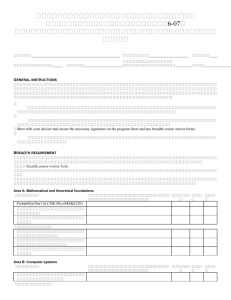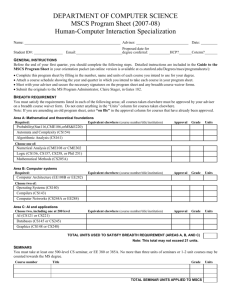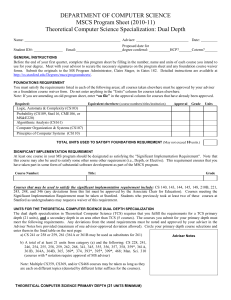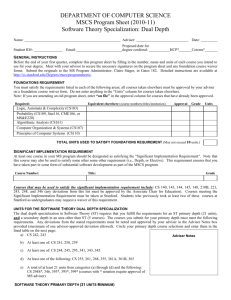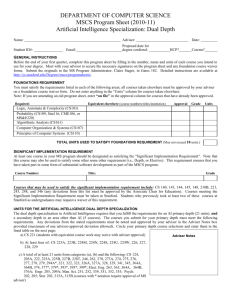DIRECTOR, SOFTWARE DEVELOPMENT PROGRAM, COMPUTER SCIENCE MISSION AND OBJECTIVES
advertisement
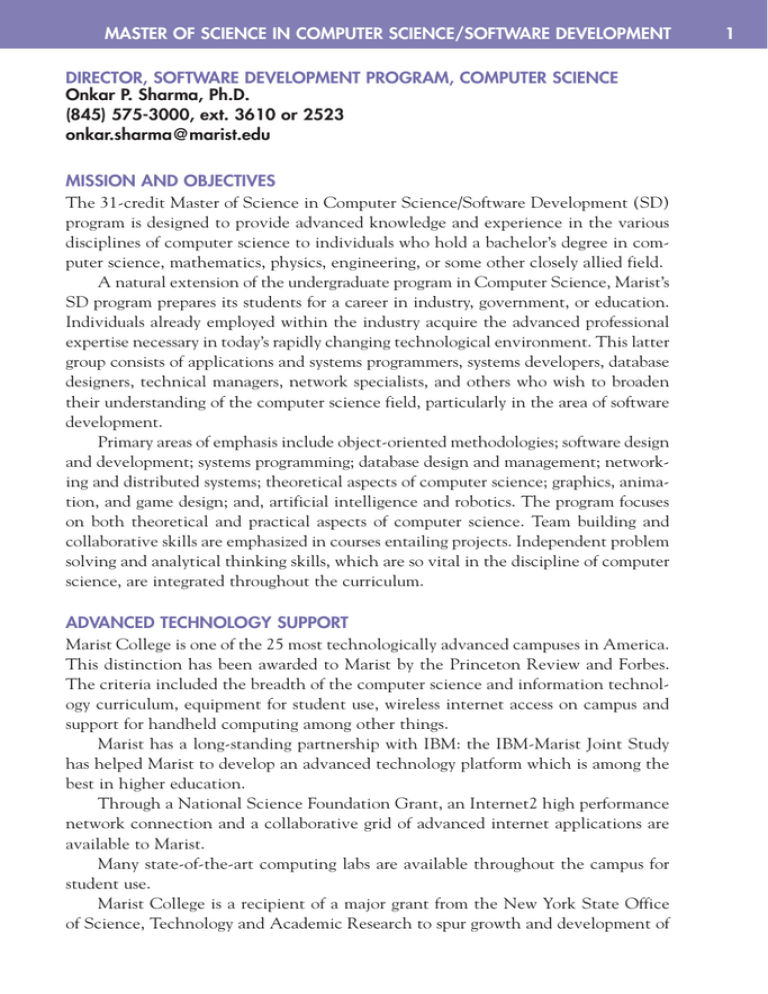
MASTER OF SCIENCE IN COMPUTER SCIENCE/SOFTWARE DEVELOPMENT DIRECTOR, SOFTWARE DEVELOPMENT PROGRAM, COMPUTER SCIENCE Onkar P. Sharma, Ph.D. (845) 575-3000, ext. 3610 or 2523 onkar.sharma@marist.edu MISSION AND OBJECTIVES The 31-credit Master of Science in Computer Science/Software Development (SD) program is designed to provide advanced knowledge and experience in the various disciplines of computer science to individuals who hold a bachelor’s degree in computer science, mathematics, physics, engineering, or some other closely allied field. A natural extension of the undergraduate program in Computer Science, Marist’s SD program prepares its students for a career in industry, government, or education. Individuals already employed within the industry acquire the advanced professional expertise necessary in today’s rapidly changing technological environment. This latter group consists of applications and systems programmers, systems developers, database designers, technical managers, network specialists, and others who wish to broaden their understanding of the computer science field, particularly in the area of software development. Primary areas of emphasis include object-oriented methodologies; software design and development; systems programming; database design and management; networking and distributed systems; theoretical aspects of computer science; graphics, animation, and game design; and, artificial intelligence and robotics. The program focuses on both theoretical and practical aspects of computer science. Team building and collaborative skills are emphasized in courses entailing projects. Independent problem solving and analytical thinking skills, which are so vital in the discipline of computer science, are integrated throughout the curriculum. ADVANCED TECHNOLOGY SUPPORT Marist College is one of the 25 most technologically advanced campuses in America. This distinction has been awarded to Marist by the Princeton Review and Forbes. The criteria included the breadth of the computer science and information technology curriculum, equipment for student use, wireless internet access on campus and support for handheld computing among other things. Marist has a long-standing partnership with IBM: the IBM-Marist Joint Study has helped Marist to develop an advanced technology platform which is among the best in higher education. Through a National Science Foundation Grant, an Internet2 high performance network connection and a collaborative grid of advanced internet applications are available to Marist. Many state-of-the-art computing labs are available throughout the campus for student use. Marist College is a recipient of a major grant from the New York State Office of Science, Technology and Academic Research to spur growth and development of 1 2 MASTER OF SCIENCE IN COMPUTER SCIENCE/SOFTWARE DEVELOPMENT businesses and industry using technology. The Marist Center for Collaborative and On-Demand Computing, established through the grant, in collaboration with local businesses including IBM, offers advanced internship and research opportunities. APPLICATION REQUIREMENTS A baccalaureate degree from an accredited college or university with a GPA of 2.75 or higher is required for admission to the graduate program in computer science. Additionally, applicants should submit the following: • A completed graduate application and application fee; • Official copies of all undergraduate and graduate transcripts; • An updated resumé specifying programming languages known. Admissions requirements for international students may be found at www.marist. edu/graduate. Formal admission to the master’s degree program will be granted to students who have satisfied these requirements. Some students may, however, be permitted to enroll in graduate courses in a non-matriculated status upon satisfactory evidence of specific prerequisites. Questions concerning mathematical/computer science competency and non-matriculated status should be addressed to the program director. MATRICULATION STATUS Applicants who satisfy all admissions requirements are admitted as matriculated students. Applicants who are required to complete undergraduate prerequisite courses are admitted as either matriculated or non-matriculated students at the discretion of the program director. Non-matriculated students must matriculate before graduation. It is the responsibility of the student to determine when matriculated status should be requested. Occasionally, conditional admission is granted; students must meet the specified conditions to continue in the program. DEGREE REQUIREMENTS To qualify for the Master of Science in Computer Science, students must matriculate and complete 31 credits as described below. Degree requirements must be satisfied within seven years of acceptance into the program, with a cumulative index of no less than 3.0. Requests for an extension of the seven-year limitation must be made in writing to the program director. Each student is expected to complete the requirements as outlined in the catalog in effect at the time of admission to Marist College. Students may choose to follow a subsequently revised catalog. All courses leading to the master’s degree in Software Development are offered in the late afternoon or in the evening. Part-time students are limited to registering for one course during their first semester unless prior approval is granted by the program director. Full-time study is defined by a semester load of at least nine credits. Starting with the second semester, it is recommended that part-time students take two courses per semester to ensure early completion of the degree requirements. MASTER OF SCIENCE IN COMPUTER SCIENCE/SOFTWARE DEVELOPMENT ADVISEMENT The Director of the Software Development Program serves as the advisor for all students in the SD program. The program director provides advice on course sequencing, approves all registration requests, and performs graduation audits. Students should discuss any questions or concerns they may have about their studies with the director. PREREQUISITES All applicants are expected to be proficient in computer programming, computer architecture, and mathematics. The level of competence can ordinarily be demonstrated by appropriate courses in the areas noted below. Computer Science Programming and Data Structures in JAVA Programming in Assembly Language Logic Design and Computer Architecture Advanced Data Structures Mathematics Discrete Mathematics Probability/Statistics Differential and Integral Calculus 3 4 MASTER OF SCIENCE IN COMPUTER SCIENCE/SOFTWARE DEVELOPMENT Graduate Courses in Software Development MASTER OF SCIENCE IN COMPUTER SCIENCE/SOFTWARE DEVELOPMENT Course Requirements Candidates for the Master of Science in Computer Science/Software Development must complete the following: Core Courses (15 credits) MSCS 510 Software Design and Development MSCS 530 Algorithms MSCS 560 Computer Networks I MSCS 610 Advanced Theory of Programming Languages MSCS 620 Distributed Systems Semester Offered Spring Spring Fall Spring Fall Laboratory Course (1 Credit) MSCS 561 Computer Networks Laboratory Fall, Spring Elective Courses (12 credits/select 4 courses) MSCS 515 Operating Systems MSCS 518 Compiler Design MSCS 521 Computer Architecture MSCS 531 Automata, Computability & Formal Languages MSCS 542 Database Management MSCS 550 Artificial Intelligence MSCS 555 Computer Graphics I Fall Spring Spring Fall Spring Fall Fall Additional Electives (offered when there is sufficient demand) MSCS 596-600 Special Topics in Computer Science MSCS 640 Distributed Database Systems MSCS 655 Computer Graphics II MSCS 660 Computer Networks II MSCS 670 Applied Artificial Intelligence MSCS 720 Thesis Spring Project Course (3 credits) MSCS 710 Project Fall Internship Courses MSCS 690, 691, 692 Graduate Internship in Software Development All Semesters Although not required, students may elect to pursue a concentration in Systems Software by taking elective courses in operating systems, compiler design, and computer architecture; or a concentration in Applications by taking elective courses in database management, artificial intelligence, and computer graphics. Elective courses may be selected from the software development courses listed in the graduate catalog, including the Thesis and Special Topics courses. Internship Courses do not satisfy the Elective requirement. MASTER OF SCIENCE IN COMPUTER SCIENCE/SOFTWARE DEVELOPMENT Catalog Description of Courses MSCS 510 Software Design and Development 3 Credits This course introduces a formal approach to the design and development of software systems. The various phases of the software development process are covered and students are introduced to an object-oriented design methodology using Unified Modeling Language. The course is project-driven and student teams design and implement a complex software system that utilizes a well-designed user interface. Java is the language of development and Java Swing will be covered. (Offered: Spring semester) Prerequisite: CMSC 335 Advanced Data Structures MSCS 515 Operating Systems 3 Credits Operating systems provide service to users to simplify their programming and data processing tasks, and they also manage systems resources to assure their efficient utilization. This course mainly presents operating systems as resource managers. In order to gain hands-on practical experience, students design and implement a multiprogramming operating system as an integral part of the course. (Offered: Fall semester) Prerequisites: CMSC 335 Advanced Data Structures; CMSC 415 Computer Architecture MSCS 518 Compiler Design 3 Credits Both the design and implementation of compilers will be studied. The lexical, syntactic, and semantic analyses of formal languages will be developed. Theoretical tools such as finite-state and push-down automata, and regular and context-free grammars will be presented as needed. Additionally, symbol-table construction and code-generation techniques will be required to develop a compiler for a selected subset of an instructor-specified small programming language. (Offered: Spring semester) Prerequisites: CMSC 335 Advanced Data Structures; CMSC 415 Computer Architecture MSCS 521 Computer Architecture 3 Credits The objective of this course is to introduce concepts related to the organization and structure of the major hardware components. The functions and implementations of, and communication between, the major components of a computer system are described. Developments to make special types of processing more efficient or reliable such as pipe lining and array processing are covered; special emphasis is placed on RISC and multiprocessing architectures. (Offered: Spring semester) Prerequisites: CMSC 330 Logic Design; MATH 221 Differential and Integral Calculus MSCS 530 Algorithms 3 Credits This course will develop students’ abilities as writers and critics of programs. The student will be introduced to a variety of program-design techniques including recursion, heuristics, divide-and-conquer, and dynamic programming. Methods of performance analysis and the theory of NP-completeness will be covered. (Offered: Spring semester) Prerequisite: CMSC 335 Advanced Data Structures. MSCS 531 Automata, Computability & Formal Languages 3 Credits Formal language theory will be presented, including the Chomsky hierarchy of formal languages with their corresponding grammars and automata. The study of formal language leads naturally to considerations related to the notion of algorithm and to the nature of the limits of algorithmic computation. Various forms of models of 5 6 MASTER OF SCIENCE IN COMPUTER SCIENCE/SOFTWARE DEVELOPMENT computation will be explored. (Offered: Fall semester) Prerequisite: CMSC 335 Advanced Data Structures MSCS 542 Database Management 3 Credits A study of the issues related to the design and administration of modern database systems, with special emphasis on relational database systems. This course will study data modelling, query languages, schema refinement and tuning of existing databases, physical implementation of databases, and systems issues in the management of data. (Offered: Spring semester) Prerequisites: MATH 250 Discrete Mathematics; CMSC 335 Advanced Data Structures MSCS 550 Artificial Intelligence 3 Credits This course introduces students to basic concepts and techniques of artificial intelligence, or intelligent systems, and gives insight into active research areas and applications. Emphasis is placed on representation as a central and necessary concept for work in intelligent systems. (Offered: Fall semester) Prerequisite: CMSC 335 Advanced Data Structure MSCS 555 Computer Graphics I 3 Credits This course introduces students to all aspects of computer graphics: hardware, software, and applications. In the course, students will learn the basic concepts underlying computer graphics, and gain experience with at least one graphical application programming interface. (Offered: Fall semester) Prerequisites: CMSC 310 Object-Oriented Programming Using C++; MATH 221 Differential and Integral Calculus MSCS 560 Computer Networks I 3 Credits This course will focus on the seven layers of the OSI Network Model. Students are introduced to hardware components of a network such as client and server machines, transmission media, bridges, routers and gateways, as well as network software components, and in particular the TCP/ IP Protocol Suite. Topics covered include: Switching Techniques, Data Link Protocols, Media Access Control, TCP/IP Protocol Suite. (Offered: Fall semester) Prerequisites: CMSC 415 Computer Architecture; MATH 221 Calculus I; MATH 130 or 330 Probability/Statistics Corequisite: MSCS 561 Computer Networking Laboratory MSCS 561 Computer Networks Laboratory 3 Credits This is a hands-on course in the building and troubleshooting of both peer-to-peer and client/server networks at all levels of the OSI and Internet Network models. The course consists of two halves: the first focuses on networking basics and peer-topeer networks, the second on client/server networks. Microsoft Windows NT 4.0 combined with the Back Office Small Business Server is the platform for the client/server portion. The objective will be to develop a typical Intranet as would be used by a small business or department that provides web serving, e-mail, proxy/firewall protection, and DNS. This course provides the student with the hands-on knowledge and experience to allow the building, development, and troubleshooting of an Intranet Network for the typical small business or department. (Offered: Fall and Spring semester) Corequisite: MSCS 560 Computer Networks I MASTER OF SCIENCE IN COMPUTER SCIENCE/SOFTWARE DEVELOPMENT MSCS Special Topics 3 Credits Fall semester) Prerequisites: MSCS 510 Software Design and Development; MSCS 560 Computer Networks I MSCS 596 Systems Software MSCS 597 Computer Architecture MSCS 598 Database MSCS 599 Artificial Intelligence MSCS 600 Computer Science Special-topics courses serve as a vehicle by which a division may offer a topical or thematic study not included in the regular course offerings. The specific content is indicated when the course is listed in the schedule of classes. (Offered upon demand or instructor interest in Spring semester.) Prerequisite: Permission of Instructor MSCS 640 Distributed Database Systems 3 Credits Consideration of the problems and opportunities inherent in distributed databases on a network computer system. Topics covered include file allocation, directory systems, dead-lock detection and prevention, synchronization, query optimization, and fault tolerance. Prerequisites: MSCS 542 Database Management; CMSC 335 Advanced Data Structures MSCS 610 Advanced Theory (Structure) of Programming Languages 3 Credits Data and control abstractions are considered. Advanced control constructs including backtracking and non-determinism are covered. Emphasis is on machine-independent implementation of programming language constructs. (Offered: Spring semester) Prerequisites: CMSC 335 Advanced Data Structures; CMSC 415 Computer Architecture MSCS 620 Distributed Systems 3 Credits This course studies Open Standards distributed systems based on the TCP/IP protocol. The course exposes students to Internet addresses, sockets, streams, universal character codes, threads, and Internet protocols like SMTP, HTTP, MIME, etc. The course also investigates several object and service distribution methods like Remote Method Invocation (RMI), Common Object Request Broker (CORBA), JavaSpaces, and Jini. The course pursues a practical approach to these ideas through simple Java programs as well as a larger project written in Java in which small student teams analyze, design, and build a distributed system using software development practices. (Offered: MSCS 655 Computer Graphics II 3 Credits This course introduces advanced modeling and viewing techniques in computer graphics such as surface patches, solid modeling, hidden surface removal, ray tracing, radiosity, and animation. Prerequisite: MSCS 555 Computer Graphics I MSCS 660 Computer Networks II 3 Credits The investigation in more depth of some of the topics introduced in Computer Networks I. Among some of the topics chosen by the instructor and the class to be the main concentration for that particular semester: queuing theory, performance analysis of basic access protocols, a detailed analysis of routing algorithms, flow control and buffer allocation algorithms, Internet working, protocol verification, and encryption techniques. Prerequisite: MSCS 560 Computer Networks I MSCS 670 Applied Artificial Intelligence 3 Credits This course builds upon the first level AI course by concentrating on a limited number of topics from AI, investigating these topics to considerable depth, and emphasizing the design and implementation of software per- 7 8 MASTER OF SCIENCE IN COMPUTER SCIENCE/SOFTWARE DEVELOPMENT taining to these topics. Selection of specific topics to be pursued will be determined by the instructor. Prerequisite: MSCS 550 Artificial Intelligence MSCS 690, 691, 692 Graduate Internship in Software Development One, two, and three credits respectively The graduate internship will provide advanced professional experience in the field of computer science. This course enables students to integrate the elements of their formal preparation and to apply theoretical concepts to real-world software development. Graduate Internships cannot be used to meet any elective requirements. Arrangements should be made with the graduate director and internship coordinator. (Offered Fall, Spring, and Summer semesters) Prerequisites: Completion of 12 graduate credits and 3.0 GPA MSCS 710 Project 3 Credits This is a project-based course. Students will work in teams to analyze, design, and implement a large system chosen from a list of selected projects. Students will utilize the skills gained in previous courses, especially Software Design and Development, in working as a team going through the various phases of the software development process. Student teams will have milestone presentations, including a final presentation, throughout the course. This course meets on a weekly basis. (Offered Fall semester) Prerequisites: Completion of at least 18 credits and MSCS 510 Software Design and Development MSCS 720 Thesis 3 Credits Thesis can only be taken by a student who has completed the project course. During the semester prior to enrollment in Thesis, the student must submit a thesis proposal for approval to register for Thesis to his/her project advisor or graduate director six weeks prior to the end of the semester in which the student is enrolled for the project course. If approved, the Thesis advisor, the program director, and the student, acting together, solicit two additional faculty members to act as members of the student’s Thesis Committee. The three faculty members constituting the committee may include not more than one adjunct faculty member. During the semester in which Thesis is taken for credit, the following must take place: As the thesis course progresses, the student works on his/her thesis under the guidance of his/her thesis advisor. The student meets with his/her advisor periodically, as determined by the latter, to seek guidance and submit progress reports. The student submits the completed thesis to the three faculty members of his/her committee by the tenth week of the semester. The thesis must be found acceptable by the thesis advisor and at least one additional committee member. In the event that revision of the thesis is recommended, it may be necessary to issue an incomplete grade (a grade of X). This grade may be changed at any point in the future after the requirement listed above has been satisfied. The student will then receive a regular grade for Thesis. Prerequisite: MSCS 710 Project MASTER OF SCIENCE IN COMPUTER SCIENCE/SOFTWARE DEVELOPMENT Computer Science/Software Development and Information Systems Faculty ROBERT M. CANNISTRA Professional Lecturer of Computer Science, Information Systems and Information Technology. Degrees: B.S., State University of New York at Brockport; M.S., Marist College (in progress). Specialties: Network Infrastructure and Design, PolicyBased Routing, Network Security RON COLEMAN Assistant Professor of Computer Science, 2002. Degrees: B.S., The City College of New York; M.S., Ph.D., Polytechnic University. Specialties: Data mining; Machine Learning; Distributed Systems; Software Design and Development; Game Design and Programming CRAIG FISHER Associate Professor of Information Systems, 1989. Degrees: B.S., State University of New York at Oswego; M.A., Ball State University; Ph.D., State University of New York at Albany. Specialties: System & Information Concepts; Problem Solving & Programming; Systems Analysis & Design; Database Management JAN HARRINGTON Assistant Professor of Information Systems, 1989. Degrees: B.S., University of Washington; M.L., University of Washington; Ph.D., Drexel University. Specialties: Data Management; System Architecture; Object-Oriented Technologies HELEN M. HAYES Assistant Professor of Mathematics and Computer Science, 1983. Degrees: B.A., College of St. Elizabeth; M.S., Fordham University; M.S.C.S., Syracuse University. Specialties: Formal Languages; Computability; Algorithms; Neural Networks ALAN G. LABOUSEUR Professional Lecturer of Information Technology, 2003. Degrees: B.S., Marist College; M.S., Pace University. Specialties: Database Systems; Web Development; Programming for Business EITEL J.M. LAURIA Assistant Professor of Information Systems, 2002. Degrees: B.S., University of Buenos Aires, Argentina; M.B.A., Universidad del Salvador, Argentina / Universidad de Deusto, Spain; Ph.D., SUNY Albany. Specialties: Data Management; Information Decision Systems; Business Intelligence; OLAP; Data Mining; Statistical Machine Learning; Bayesian Belief Networks and the application in Information Technology Implementation ANNE B. MATHEUS Professional Lecturer in Information Systems and Information Technoloby; Information Systems Internship Coordinator; Director of Computer Literacy, 2001. Degrees: B.A., Marist College; M.A., Marist College; M.S.C.S., Marist College; A.B.D., SUNY Albany. Specialties: Information Decision Systems; Organizational Studies; Information Quality ROGER NORTON Dean, School of Computer Science and Mathematics, 1980. Novell Certified NetWare Administrator & NetWare Engineer. Degrees: B.S., University of Massachusetts; M.A., Brandeis University; Ph.D., Syracuse University. Specialties: Semantics of Programming Languages; Object-Oriented Programming; Distributed Computing 9 10 MASTER OF SCIENCE IN COMPUTER SCIENCE/SOFTWARE DEVELOPMENT SHEKHAR PRADHAN Assistant Professor of Computer Science. Degrees: Ph.D., Univeristy of Maryland, Computer Science; Ph.D., University of Illinois, Philosophy. Specialties: Intelligent Databases, Software Engineering, and Artificial Intelligence RUSSELL ROBBINS Assistant Professor of Information Systems, 2005. Degrees: B.S., B.A. (Finance), University of Missouri; M.S. (Accounting), SUNY Binghamton; M.S. (IT), Rensselaer Polytechnic Institute; Ph.D., Rensselaer Polytechnic Institute (in progress) ONKAR P. SHARMA Professor of Computer Science, 1986; Director, Software Development Program. Degrees: B.S.E., Bihar Institute of Technology, Bihar University, India; M.S.C.S., University of California at Berkeley; Ph.D.C.S., New York University. Specialties: Computer Architecture; Systems Software JAMES TEN EYCK Assistant Professor of Computer Science, 1983. Degrees: B.S., Lafayette College; M.S., Syracuse University; Ph.D., Syracuse University. Specialties: Computer Networks; Simulation JAMES WEIR Visiting Lecturer in Information Technology, 2003. Degrees: B.S., M.S., Lehigh University. Specialties: Multimedia; Web Applications
